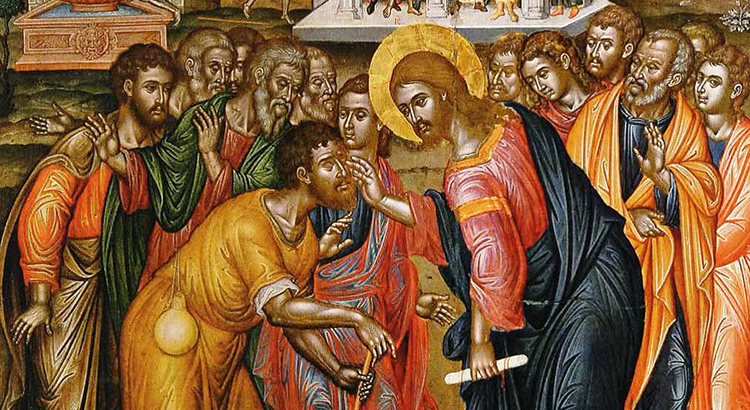Prayer for the sick
The prayer for the sick is held in the Basilica of Santa Maria in Trastevere.
Reading of the Word of God
Alleluia, alleluia, alleluia
This is the Gospel of the poor,
liberation for the imprisoned,
sight for the blind,
freedom for the oppressed.
Alleluia, alleluia, alleluia
Acts 6,8-15
Stephen was filled with grace and power and began to work miracles and great signs among the people. Then certain people came forward to debate with Stephen, some from Cyrene and Alexandria who were members of the synagogue called the Synagogue of Freedmen, and others from Cilicia and Asia. They found they could not stand up against him because of his wisdom, and the Spirit that prompted what he said. So they procured some men to say, 'We heard him using blasphemous language against Moses and against God.' Having turned the people against him as well as the elders and scribes, they took Stephen by surprise, and arrested him and brought him before the Sanhedrin. There they put up false witnesses to say, 'This man is always making speeches against this Holy Place and the Law. We have heard him say that Jesus, this Nazarene, is going to destroy this Place and alter the traditions that Moses handed down to us.' The members of the Sanhedrin all looked intently at Stephen, and his face appeared to them like the face of an angel.
Alleluia, alleluia, alleluia
The Son of Man came to serve,
whoever wants to be great
should become servant of all.
Alleluia, alleluia, alleluia
Stephen was the first of the seven deacons chosen from among the Hellenistic Jews. He was immediately noted for his strong and generous testimony - he "did great wonders and signs among the people," the Acts write. In debates no one "could not withstand the wisdom and the Spirit with which he spoke." Two chapters of Acts narrates his story. He was clearly a figure of example in the first community. It is good to underline that the "service at the table" for which the seven deacons were destined was not limited to this. Indeed, every believer needs to serve two tables, that of the poor and that of the Word. There are no exclusive specializations, some preach and others do the work of charity. Each Christian must take care of both. It is important to note that Stephen's action was "among the people," it was not a bureaucratic service, rather he was involved in the daily life of the Chirstian community. Even the members of Sanhedrin were amazed at Stephen's missionary work: "All who sat in the council saw that his face was like the face of an angel." In that important assembly, Stephen's face reminded people of the great spiritual people, of the great witnesses like Moses whose ministry was surrounded by such splendour that the children of Israel could not bear to look at the light shining from his face (Ex 34:29 ff). Like Moses, Stephen truly was a witness to God's love; he was indeed an angel sent by the Lord, such as every disciple should be. In imitation of the master, Stephen also suffers first arrest and then trial before the Sanhedrin. And in the trial, he is condemned on false charges. The story of the disciples always retraces that of the master. And Stephen, in this difficult time of his life, is sustained by the strength and the Spirit of the Lord who abandons no one, especially in the time of trial.
